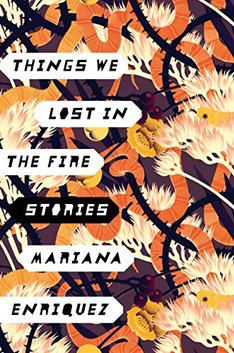Need to Know: Things We Lost in the Fire is creepy, sinister, and mesmerizing. After reading Mariana Enriquez’s short story collection*, Things We Lost in the Fire, I’m a little scared to go to bed tonight. The stories are macabre and grotesque, teeming with people, things, and phenomena that should not exist, but do. Set in Argentina and primarily featuring female narrators, the stories are linked together by common themes including, as others have noted, pervasive violence and destruction. But what I found even more fascinating is how the women in Enriquez's stories respond to the violence and destruction: whether they act in some way--and how those efforts do or do not pay off--, or whether they do nothing, which offers a kind of hollow safety. One of my favorite stories in the collection is “End of Term,” a haunting story focusing on teenage girls, one of whom is seemingly mentally ill. The narrator is one of many at the school who observes Marcela pull out her own nails and later, cut herself on the face. Other incidents of Marcela’s self-harm follow, and the narrator finds herself first interested in a detached sort of way, and then, increasingly invested in finding out why Marcela harms herself. In this story, Enriquez plays with distinctions between madness and truth and the thin line between being a detached observer and someone who has become too dangerously involved. Enriquez paints Buenos Aires and other cities within Argentina compellingly, if terrifyingly. She focuses little on the natural landscape except to indicate how it’s been affected by elements of the supernatural. Instead, her stories are primarily grounded in the places where people dwell: the “slums,” strange houses, police academies turned inns, and most frightening of all, the homes where the characters should be safest. Sometimes relationships with others provide some type of bulwark against outside forces, but many times, the stories highlight how very alone these characters are. Most of these stories provoked a visceral response from me: a clenched, tense stomach or a wince. But I kept reading, and that’s because Enriquez offers much to her readers. Concise prose, often with the air of the colloquial. Characters who are relatable in their uncertainty and their fear. And a sharp and unsettling exploration of how fragile the borders are between safety and danger. *Translated by Megan McDowell. I received a copy of this book from Blogging For Books, but all opinions expressed in this post are my own.
0 Comments
Leave a Reply. |
About me.Give me that HEA, please.
Join my mailing list.Want to receive a weekly email with links to my latest blog posts? Sign up below!
Archives
April 2024
Categories
All
|

 RSS Feed
RSS Feed
